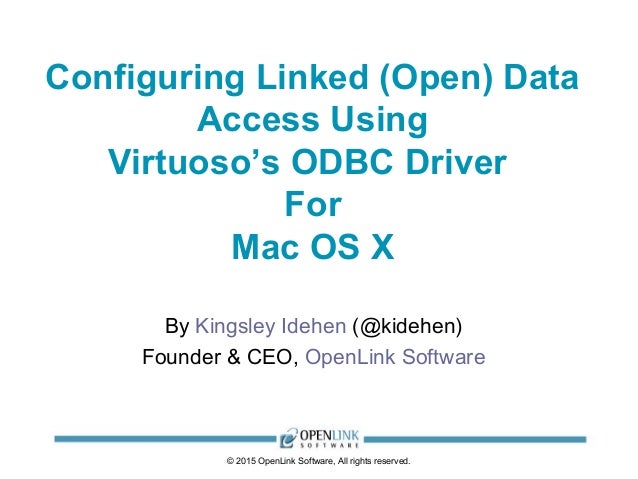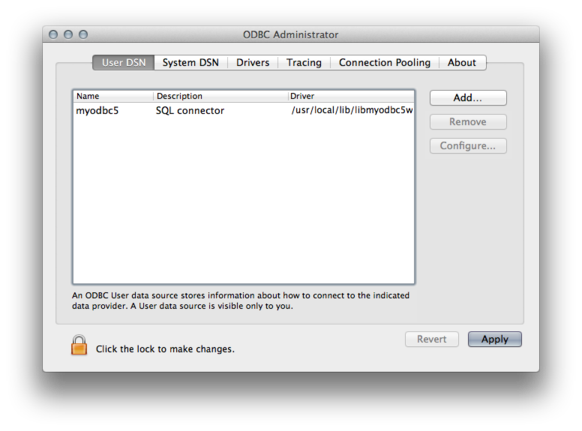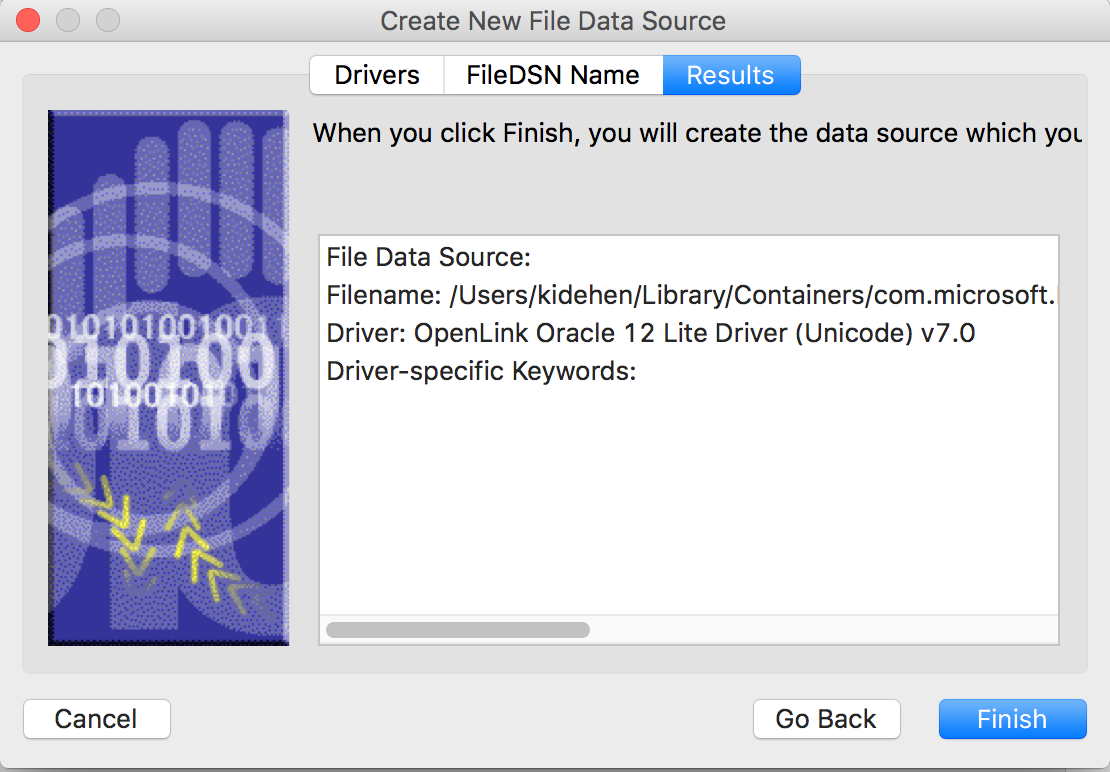The Mac OS X environment has a GUI interface for creating and configuring an IBM Informix ODBC data source name (DSN). This utility is the ODBC Administrator. IBM® Informix® Client Software Development Kit, Version 3.70. Creating and configuring a DSN on Mac OS X. This release enables the development of ODBC version 3.5 drivers and applications, includes a native Graphical ODBC Administrator for Mac OS X and Mac OS 9, and an ODBC Driver Manager component. The installer for Mac OS X creates a sample user DSN in odbc.ini in either of the following locations: /Library/ODBC/odbc.ini /.odbc.ini; Depending on the driver manager you use, the user DSN in one of these files will be effective.
To configure a DSN on macOS, you can either use the command-line utility (myodbc-installer), edit the odbc.ini file within the Library/ODBC directory of the user, or use the ODBC Administrator GUI.
The ODBC Administrator is included in OS X v10.5 and earlier; users of later versions of OS X and macOS need to download and install it manually.

To create a DSN using the myodbc-installer utility, you only need to specify the DSN type and the DSN connection string. For example:
To use ODBC Administrator:



For correct operation of ODBC Administrator, ensure that the
/Library/ODBC/odbc.inifile used to set up ODBC connectivity and DSNs are writable by theadmingroup. If this file is not writable by this group, then the ODBC Administrator may fail, or may appear to work but not generate the correct entry.There are known issues with the macOS ODBC Administrator and Connector/ODBC that may prevent you from creating a DSN using this method. In that case, use the command line or edit the
odbc.inifile directly. Existing DSNs or those that you created using the myodbc-installer tool can still be checked and edited using ODBC Administrator.
Open the ODBC Administrator from the
Utilitiesfolder in theApplicationsfolder.Figure 5.6
ODBC AdministratorDialogFrom the
ODBC Administratordialog, choose either the User DSN or System DSN tab and click .Select the Connector/ODBC driver and click .
You will be presented with the
Data Source Name(DSN) dialog. Enter theData Source Nameand an optionalDescriptionfor the DSN.Figure 5.7
ODBC Administrator Data Source NameDialogClick to add a new keyword/value pair to the panel. Configure at least four pairs to specify the
server,username,passwordanddatabaseconnection parameters. See Section 5.2, “Connector/ODBC Connection Parameters”.Click to add the DSN to the list of configured data source names.
A completed DSN configuration may look like this:
Figure 5.8 ODBC Administrator Sample DSN Dialog
Odbc For Mac Os X
You can configure other ODBC options in your DSN by adding further keyword/value pairs and setting the corresponding values. See Section 5.2, “Connector/ODBC Connection Parameters”.
Odbc For Macos
Before configuring an ODBC driver on a Mac, you will need to download and install a Driver Manager, iODBC. Refer to your System Requirements documentation for iODBC versions compatible with your ODBC Driver:
iODBC can be downloaded from iODBC.org.
For this example, we are using version 3.52.12.
Download mxkozzzz.dmg file to your computer. Double click mxkozzzz.dmg file to mount the disk image
Double click iODBC-SDK.pkg to run the installer. You will be guided through the steps necessary to install this software. Now you can register your ODBC driver.
Mysql Odbc Mac
Permission setup for iODBC on Mac OS
Odbc For Mac Os Versions
Allow write permissions to enable value update of USER DSN in iODBC Administrator
Odbc For Mac Os High Sierra
- In Finder, from your home {username} folder, go to {username}/Library/ODBC folder and find the file named odbc.ini.
In this blog, we only need to allow the permission in user’s folder because we are only updating value in USER DSN. If you want to use a SYSTEM DSN instead, click “Go” in the finder menu and choose “Go to Folder…” or press Shift + Command + G as shortcut. Type in /Library/ODBC and click on “Go”.
You can find the file named odbc.ini. - Right click on odbc.ini, and choose Get Info option.
- In Sharing & Permission section, ensure your user group has the permission to Read & Write. You might need administrator permission to edit this section. Click on the lock icon at bottom right corner to unlock the permission to edit the list.
the list, click the “+” button at bottom left corner to add yourself. Then select your privilege to see the options and set it as Read & Write.
- Now you are all set with the permission settings.
